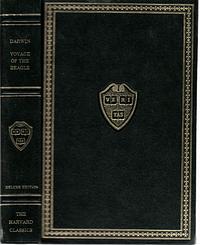Take a photo of a barcode or cover
adventurous
challenging
informative
inspiring
slow-paced
This was my 1st and only book finished in 2020.
I was inspired to buy this book when I was living in Sydney, Australia. Unfortunately I had already gone back home to the UK before I read the part set in Australia; but I visited the eponymous Darwin Track in the Blue Mountains, so it was fascinating to later read about where I'd been.
Overall very enjoyable. Some long and dull sections relating to the sea and geology; it was hard to follow what he was talking about without prior knowledge or looking things up.
My favourite sections were the descriptions of people and animals, unknown or barely known to the western world.
Very adventurous and inspiring to someone who likes to travel.
I was inspired to buy this book when I was living in Sydney, Australia. Unfortunately I had already gone back home to the UK before I read the part set in Australia; but I visited the eponymous Darwin Track in the Blue Mountains, so it was fascinating to later read about where I'd been.
Overall very enjoyable. Some long and dull sections relating to the sea and geology; it was hard to follow what he was talking about without prior knowledge or looking things up.
My favourite sections were the descriptions of people and animals, unknown or barely known to the western world.
Very adventurous and inspiring to someone who likes to travel.
Graphic: Colonisation
Moderate: Racism
Not sure how to rate this one. It is a historical treasure and I’m glad I read it even if I took a really long break in the middle
The Voyage of the Beagle by Charles Darwin is a collection of journal entries written during Darwin's famous trip around the world from 1831-1836.
Personal note: this was a hard book to get into. I nearly quit several times before getting halfway. And it slowed down my reading pace for the year considerably. But now I'm pleased to add this book to my read collection.
What makes the book difficult to get into?
Well, it's dated.
I'm not certain how accurate Darwin's geological and biological theories still are, but I'm pretty sure newer and better ones have been adopted by modern scientists.
That science is a method of discovery rather than a fixed sum of knowledge doesn't mitigate the fact that reading old theories is a waste of time.
What saves the book is Darwin's other observations about Gauchos, Brazilians, and the indigenous peoples of Argentina, Tierra del Fuego, Chile, and various islands the Beagle stopped at on the return journey.
As an American, I grew up well-versed in the history of manifest destiny that resulted in European descendants encroaching upon indigenous lands and many of the resultant wars and tragedies. But I've never learned anything about the native peoples of South America below Peru.
So getting a snapshot of South America in this period through Darwin's eyes was revelatory.
Aside from these sociological observations, Darwin occasionally beautifully describes scenes and landscapes:
"...to the south we had a scene of savage magnificence, well becoming Tierra del Fuego. There was a degree of mysterious grandeur in mountain behind mountain, with the deep intervening valleys, all covered by one thick, dusky mass of forest. The atmosphere, likewise, in this climate, where gale succeeds gale, with rain, hail, and sleet, seems blacker than anywhere else. In the Straight of Magellan, looking due southward from Port Famine, the distant channels between the mountains appeared in their gloominess to lead beyond the confines of this world."
In a younger world hampered by distance and the difficulties of navigation by sea, I can easily imagine The Voyage of the Beagle becoming a best-seller - which in fact happened upon its publication in 1839.
This book would be well-read by anyone interested in history or adventure.
Personal note: this was a hard book to get into. I nearly quit several times before getting halfway. And it slowed down my reading pace for the year considerably. But now I'm pleased to add this book to my read collection.
What makes the book difficult to get into?
Well, it's dated.
I'm not certain how accurate Darwin's geological and biological theories still are, but I'm pretty sure newer and better ones have been adopted by modern scientists.
That science is a method of discovery rather than a fixed sum of knowledge doesn't mitigate the fact that reading old theories is a waste of time.
What saves the book is Darwin's other observations about Gauchos, Brazilians, and the indigenous peoples of Argentina, Tierra del Fuego, Chile, and various islands the Beagle stopped at on the return journey.
As an American, I grew up well-versed in the history of manifest destiny that resulted in European descendants encroaching upon indigenous lands and many of the resultant wars and tragedies. But I've never learned anything about the native peoples of South America below Peru.
So getting a snapshot of South America in this period through Darwin's eyes was revelatory.
Aside from these sociological observations, Darwin occasionally beautifully describes scenes and landscapes:
"...to the south we had a scene of savage magnificence, well becoming Tierra del Fuego. There was a degree of mysterious grandeur in mountain behind mountain, with the deep intervening valleys, all covered by one thick, dusky mass of forest. The atmosphere, likewise, in this climate, where gale succeeds gale, with rain, hail, and sleet, seems blacker than anywhere else. In the Straight of Magellan, looking due southward from Port Famine, the distant channels between the mountains appeared in their gloominess to lead beyond the confines of this world."
In a younger world hampered by distance and the difficulties of navigation by sea, I can easily imagine The Voyage of the Beagle becoming a best-seller - which in fact happened upon its publication in 1839.
This book would be well-read by anyone interested in history or adventure.
A most wonderful book, written by a man who's keen eye and descriptive and methological approach to everything, is sure to be able to captivate you on anything you would normally consider boring (For me, geology).
I've been listening to the audiobook as narrated by David Case, and he does an immense job. This is just about the most cozy book I know, and a clear favorite of mine.
I've been listening to the audiobook as narrated by David Case, and he does an immense job. This is just about the most cozy book I know, and a clear favorite of mine.
Delightful read. A great mix of natural history, geology, anthropology, and sociology of the time. Insightful read. The perspective of a young scholar in the process of being shaped by his perceptions and the stories he has been told. His mixed views of peoples if different continents was probably not the status quo of the time, yet quite refined and at times forward thinking. Exciting read. The text is easy to read and the excitement keeps you going. The way the journey is conveyed reminds me of Five Weeks in a Balloon, yet has so much more to give.
Highly recommended for anyone int he scientific or anthropological field.
Highly recommended for anyone int he scientific or anthropological field.
I think of this as akin to a 'making of' documentary companion to his seminal Origin of Species.
It's great. Darwin is a magnificent narrator, recording with colour and vibrancy environments and cultures that are now gone or irrevocably changed.
There are a few comments that raise an eyebrow on a modern reader, but as a product of his time Darwin had an extraordinarily humane and progressive appreciation of what was happening in the world as the colonial powers swept over it. On occasions he really gets it, on others he doesn't.
It's great. Darwin is a magnificent narrator, recording with colour and vibrancy environments and cultures that are now gone or irrevocably changed.
There are a few comments that raise an eyebrow on a modern reader, but as a product of his time Darwin had an extraordinarily humane and progressive appreciation of what was happening in the world as the colonial powers swept over it. On occasions he really gets it, on others he doesn't.
Kinda come away from this loving Darwin. He's a pretty approachable writer, inquisitive, and has an endless sense of wonder at all the cool stuff he saw on his adventure. He's also not afraid to completely shit on things he thinks are ugly or unappealing, like the entire countries of New Zealand and Australia, or a stupid species of bird he could have killed just by walking up to it. The cataloguing of every bird, plant, bug, and rock at each place gets tedious though.
I read this specifically for the chapters on the Galapagos Islands. It can be a bit dry but it's interesting if you like that sort of thing.
A great book to see that not only did he observe animals and plants, but also human behaviour, between slaves, indigenous people and the white colonizers throughout all their colonies and how different each one developt. Also you get to see a more biased position from his part being an Englishman nd not just a scientist in those times and what was considered normal back then. Sometimes it is a bit difficult to understand with the scientific names of animals and coordinates of places, but overall a great book to want you to go out there and see these places and how much they have changed since then.




